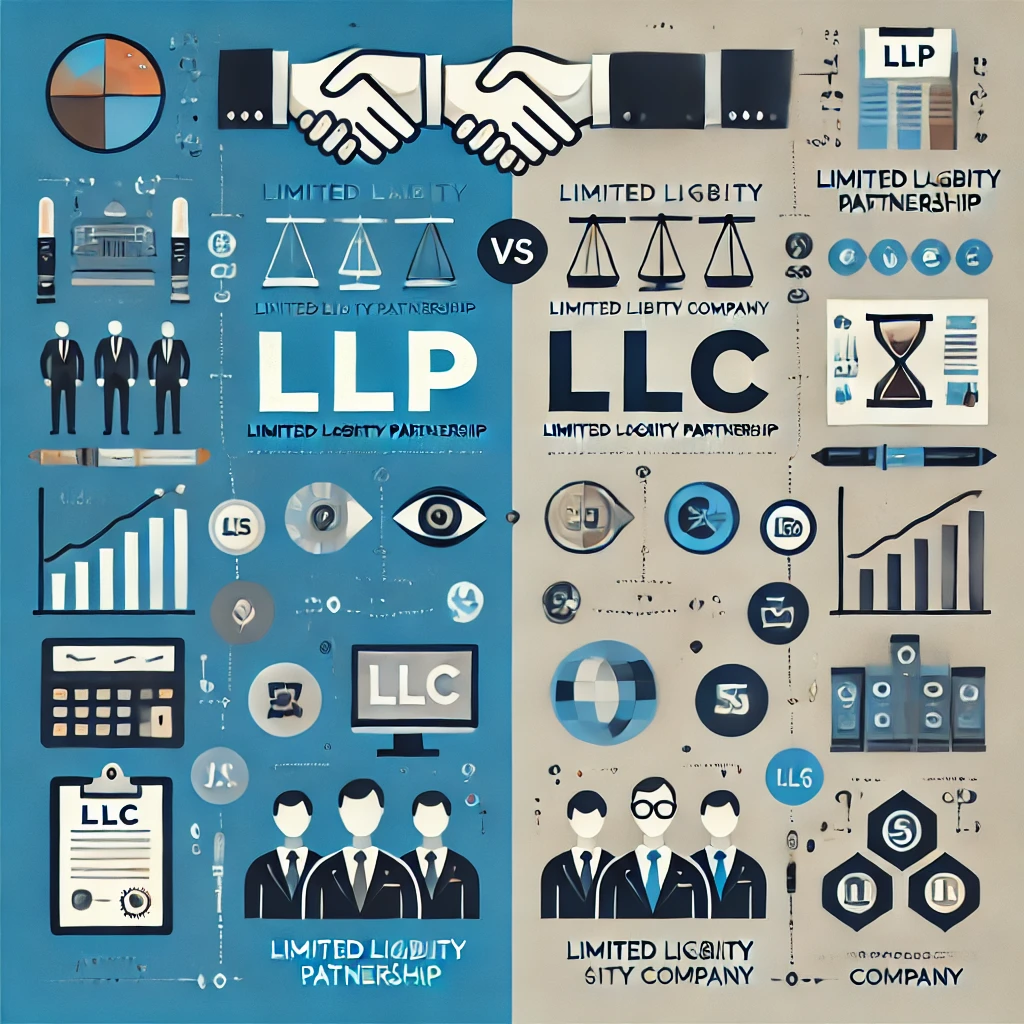User Intent
People searching for “LLP vs LLC difference” are usually business owners, entrepreneurs, or researchers looking for a clear comparison between these two structures. They want easy-to-understand, detailed information to make the right choice for their business.
Introduction
Choosing the right business structure is essential for protecting your assets, minimizing taxes, and ensuring smooth operations. Limited Liability Partnership (LLP) and Limited Liability Company (LLC) are two popular options. While both offer liability protection, they differ in taxation, management, and compliance. In this article, we’ll break down the key differences between LLP and LLC to help you make an informed decision.
Definition
- What is an LLP? A Limited Liability Partnership (LLP) is a business structure where partners share limited liability. This means they are not responsible for the actions or debts of other partners. LLPs are commonly used by professionals like lawyers, accountants, and consultants.
- What is an LLC? A Limited Liability Company (LLC) is a flexible business structure that combines elements of corporations and partnerships. It protects the owners (members) from personal liability while allowing different taxation and management options.
Where Are LLP and LLC Used?
- LLP Applications:
- Preferred by professionals like lawyers, doctors, and architects.
- Best for businesses with multiple partners needing defined roles.
- Used when limited liability is necessary, but corporate taxation isn’t ideal.
- LLC Applications:
- Suitable for startups, small businesses, and entrepreneurs.
- Used when owners want liability protection with flexible management.
- Ideal for single-owner or family-run businesses.
Benefits
- Advantages of LLP:
- Limited Liability – Partners are only liable for their investment.
- Easy Setup – Fewer compliance requirements than corporations.
- Tax Benefits – Pass-through taxation avoids double taxation.
- Flexible Management – Partners have equal decision-making power.
- No Minimum Capital – Can start with low investment.
- Advantages of LLC:
- Personal Asset Protection – Members’ personal assets are safe.
- Tax Flexibility – Can choose pass-through taxation or corporate tax.
- Less Compliance – Fewer regulations than corporations.
- More Credibility – Appears more professional than sole proprietorships.
- Flexible Ownership – Can be owned by individuals, companies, or foreigners.
Limitations
- Drawbacks of LLP:
- Restricted to Professionals – Not suitable for all business types.
- Limited Ownership Transfer – Ownership cannot be easily transferred.
- Dissolution Risk – Business may dissolve if key partners leave.
- Less Credibility – Investors prefer corporations over LLPs.
- Tax Complexity – Different tax treatments in different countries.
- Drawbacks of LLC:
- Self-Employment Taxes – Members may need to pay high taxes.
- Annual Filing Fees – Some states require yearly renewals.
- Varied State Laws – LLC rules differ from place to place.
- Less Investor Appeal – Corporations attract more investors.
- Complex Formation in Some Regions – Some places have stricter regulations.
Comparative Table: LLP vs. LLC
| Feature | LLP (Limited Liability Partnership) | LLC (Limited Liability Company) |
|---|---|---|
| Liability Protection | Limited to each partner’s investment | Personal assets protected |
| Taxation | Pass-through taxation | Choice of pass-through or corporate taxation |
| Ownership Structure | Partners manage business | Members can be individuals or entities |
| Best For | Professional services | Startups, entrepreneurs, small businesses |
| Formation Complexity | Moderate compliance | Varies by state/country |
| Investor Appeal | Less attractive | More credibility than LLPs but less than corporations |
| Compliance Requirements | Moderate | Generally low but depends on location |
Conclusion
The choice between LLP and LLC depends on your business goals, liability concerns, and tax preferences. If you are a professional offering services with partners, an LLP may be the best choice. If you want a more flexible business structure with strong liability protection, an LLC is the way to go. Be sure to consult a legal or tax expert before making a final decision.
FAQs
- Which is better: LLP or LLC?
- It depends on your needs. LLPs are great for professionals, while LLCs suit startups and small businesses.
- Can an LLP be converted into an LLC?
- Yes, in most places, you can convert an LLP into an LLC with legal paperwork.
- Do LLP and LLC have the same tax benefits?
- No. LLPs have pass-through taxation, while LLCs can choose their tax structure.
- Is an LLP or LLC easier to manage?
- LLCs offer more flexibility and fewer restrictions.
- Which is better for a single-owner business?
- LLCs are better since LLPs require at least two partners.
For further details access our website https://vibrantfinserv.com
and also visit govt site : https://www.mca.gov.in

